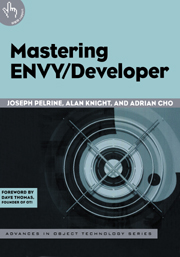Book contents
- Frontmatter
- Contents
- Foreword
- Acknowledgments
- Introduction
- Chapter 1 Getting Started
- Chapter 2 Basic Concepts
- Chapter 3 Team Development
- Chapter 4 Advanced Development
- Chapter 5 Formal Concepts
- Chapter 6 Packaging and Delivery
- Chapter 7 Extending the System
- Chapter 8 Administration
- Chapter 9 Goodies
- Chapter 10 Troubleshooting
- Appendix: A Selected Annotated API of ENVY System Classes
- Glossary
- References
- Index
Chapter 5 - Formal Concepts
Published online by Cambridge University Press: 11 January 2010
- Frontmatter
- Contents
- Foreword
- Acknowledgments
- Introduction
- Chapter 1 Getting Started
- Chapter 2 Basic Concepts
- Chapter 3 Team Development
- Chapter 4 Advanced Development
- Chapter 5 Formal Concepts
- Chapter 6 Packaging and Delivery
- Chapter 7 Extending the System
- Chapter 8 Administration
- Chapter 9 Goodies
- Chapter 10 Troubleshooting
- Appendix: A Selected Annotated API of ENVY System Classes
- Glossary
- References
- Index
Summary
The previous four chapters have described ENVY concepts in a tutorial form, helpful for developers getting started with ENVY and advanced developers looking for detailed information and motivation for features. In this chapter we take a different approach, describing the ENVY feature set in a more formal way. This is more appropriate for readers with a background in configuration management seeking to understand the differences between ENVY and other systems. It's also appropriate for users familiar with ENVY who want to understand more about the theoretical motivations behind certain features. This chapter covers most of the material explained in the previous four chapters but in less detail and from a more theoretical perspective.
ENVY Products
Technically, ENVY is a generic term for an entire product line from Object Technology International (OTI). Most commonly, it is used to refer to the team programming environment ENVY/Manager. ENVY/Manager has existed for a variety of different Smalltalk environments. It was originally written for Digitalk's Smalltalk/V line, ported to ParcPlace's VisualWorks (now owned by Cincom Systems), and was then tightly integrated into IBM's VisualAge product line, supporting both the Smalltalk and Java versions. In this chapter we use the term ENVY to refer to the ENVY/Manager environment, as it exists for VisualWorks and VisualAge Smalltalk.
Components
The fundamental concept in ENVY is that of software components. We will begin introducing the different types of components: applications, subapplications, classes, class extensions, and configuration maps.
- Type
- Chapter
- Information
- Mastering ENVY/Developer , pp. 99 - 124Publisher: Cambridge University PressPrint publication year: 2001

